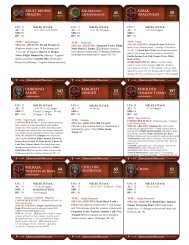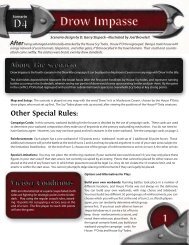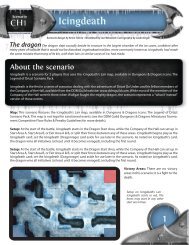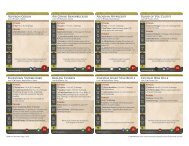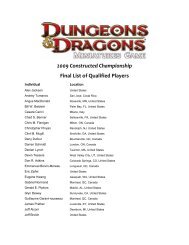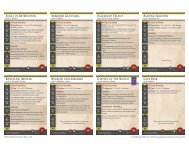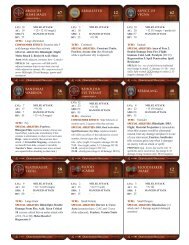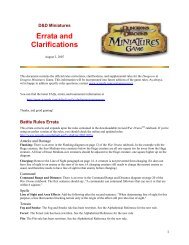Create successful ePaper yourself
Turn your PDF publications into a flip-book with our unique Google optimized e-Paper software.
Undead: (Creature Type) Undead are not living creatures. Undead have Fearless as well as<br />
the following special abilities: Immune Confusion, Critical Hits, Dominate, Incite,<br />
Paralysis, Poison, Sleep, Sneak Attack, Stun. Heal effects deal damage to Undead (see<br />
the heal entry, on page 37).<br />
There is one exception to Undead creatures’ Fearless ability: They must make morale<br />
saves against the Turn Undead ability (see that entry, above) and morale saves to rally if they<br />
are turned.<br />
Unique (Only 1 creature whose name contains NAME in your warband) For example, Regdar,<br />
Human Fighter and Regdar, Adventurer both count as “Regdar”; you can have only one or the<br />
other in your warband.<br />
Each of your opponents and teammates can have their own copy of a Unique creature.<br />
Vermin: (Creature Type) All Vermin creatures have the following special abilities: Immune<br />
Confusion, Dominate, Incite, Sleep.<br />
victory area: Each battle map contains victory areas, each labeled for the player who scores<br />
victory points for occupying it. See the Assault scenario on page 28.<br />
Creatures with certain abilities, such as Scout and Wandering Monster, can set up in victory<br />
areas instead of in starting areas.<br />
Vulnerable ENERGY: This ability appeared in earlier sets. It has now been replaced by Double<br />
Damage from ENERGY (see that entry on page 35). Treat a creature with Vulnerable<br />
ENERGY as having that special ability instead.<br />
Wandering Monster: Instead of placing this creature in your starting area at the start of the<br />
skirmish, place it in a random victory area. If this creature enters the battle map after the first<br />
turn, it enters like any other creature.<br />
Warband Building: (Commander Effect) Adding this creature to your warband allows you to<br />
break one or more of the usual warband construction <strong>rules</strong>. Usually, this ability allows you to<br />
ignore faction restrictions for a certain type or kind of creature. Because this is a Commander<br />
Effect, it doesn’t apply to other commanders, so you normally can’t use Warband Building to<br />
add an off-faction commander to your warband.<br />
Waylay (This creature starts off the battle grid; before rolling initiative for a round, you may<br />
place this creature on a victory area of your choice. Use only once per skirmish.) Until it<br />
enters play, this creature counts as eliminated and scores victory points for the opponent.<br />
Whirlwind Attack (On its turn, if this creature moves no more than 1 square, it can make a<br />
separate melee attack against each enemy creature within its Melee Reach) Entering difficult<br />
terrain or being slowed in some other fashion prevents using Whirlwind Attack. This ability<br />
replaces a creature’s attacks. If a creature has no Melee Reach listed on its stat card, it can<br />
attack each adjacent enemy once.<br />
Wild (Always out of command) The Beastmaster special ability removes Wild from Animals or<br />
Magical Beasts of the specified level.<br />
wounded: A creature that has taken damage, reducing its hit points below its starting amount,<br />
is wounded.<br />
your warband: (Range) A spell or ability with this range affects all creatures in your warband,<br />
no matter where they are. (In special scenarios, it even affects creatures that are not yet<br />
in play.)<br />
47



